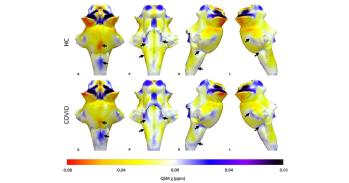
A new study aims to be the biggest study of risk perception ever undertaken.
A new study aims to be the biggest study of risk perception ever undertaken.
“Risk is a very complex subject. We all take risks every day and in virtually every area of our lives. If you can’t predict with absolute certainty what will happen when you make a choice, you are taking a risk.
Professor David Spiegelhalter, the University of Cambridge Winton Professor for the Public Understanding of Risk
Do you know how risky scuba diving is compared to riding a motorbike? When choosing between a fairly safe option and a slightly riskier one, which do you take? A new study, launched last night on the BBC’s Bang Goes the Theory, aims to be the biggest study of risk perception ever undertaken.
The Big Risk Test, spearheaded by Professor David Spiegelhalter, the University of Cambridge Winton Professor for the Public Understanding of Risk, and Dr Mike Aitken, a lecturer in the Department of Experimental Psychology at Cambridge, will examine how we think and feel about potential hazards, from taking medication to global climate change.
“Risk is a very complex subject,” said Professor Spiegelhalter. “We all take risks every day and in virtually every area of our lives. If you can’t predict with absolute certainty what will happen when you make a choice, you are taking a risk.”
Whether it’s deciding not to carry an umbrella on a cloudy day, or choosing what type of treatment to have for a potentially life-threatening illness, we all make countless and often complex decisions about risk all the time.
Dr Aitken added, “With the Big Risk Test, we want to try and answer some challenging questions about how people think about risk and understand why people have such different opinions and feelings about the risks they choose to take - decisions that can have a major impact on their lives.”
There are many different kinds of risk. Taking a chance on a financial investment is a fundamentally different activity to parachuting out of an aeroplane, but they are still both ‘risky’. The study will provide a ‘risk personality’ score, showing whether you take larger or smaller risks than the average in each of five broad areas – ethical, financial, health & safety, recreation and social risks.
“The scores at the end of the test are fun; a way of thanking participants for their time,” said Dr Aitken. “However, the results of the study could have serious benefits, from helping us understand how different groups in society perceive risks differently, to the best way to advise patients about the risks of a new medication.”
The study will cover the following six areas:
Feelings about risk:
The scientists want to know how individuals feel about a variety of hazards, including things that affect people individually, as well as bigger issues, such as climate change, that affect the whole of society.
Knowledge of risk:
Do you know how risky scuba diving is compared to riding a motorbike? Or how likely it is that your flight will be delayed, or you will fail your driving test? The researchers want to know what influences our ability to assess the scale of risks accurately.
Understanding risk:
Risks can be communicated in a wide variety of ways, for example, by using words, numbers and pictures. The researcher hope to determine which methods people find easiest to understand, and which ones help them to remember information most effectively. The better the method of communication, the more informed our decisions will be, which is particularly important when it comes to issues like health.
Risk behaviour:
When confronted with a choice between a fairly safe option and a slightly riskier one, which do you take? Do you believe in luck and does it influence your attitude to risk-taking? In the Big Risk Test, they will look at when people take more chances and when people play it safe, and what factors affect these decisions.
Calculating risk:
Risks are often presented in terms of mathematical concepts, such as percentages and probabilities. They hope to find out how confidence with numbers might influence our ability to calculate risk.
Appetite for risk:
The scientists are looking at the areas of people’s lives in which they are most comfortable taking risks, and hope to find out whether there is relationship between the type of person you are and the sort of risks you are prepared to take.
Professor David Spiegelhalter has been Winton Professor for the Public Understanding of Risk since 2007. The post was made possible thanks to a generous donation by the Winton Charitable Foundation as part of the University's 800th Anniversary Campaign.
This work is licensed under a Creative Commons Licence. If you use this content on your site please link back to this page.





